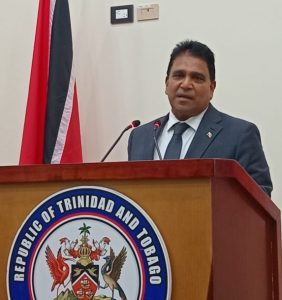By Sue-Ann Wayow
GOVERNMENT has no intention to devalue the Trinidad and Tobago Dollar (TTD) says Finance Minister Colm Imbert.
Speaking in the Senate on Tuesday, Imbert said, “We intend to maintain the status quo with respect to our exchange rate regime. We do not intend to devalue the currency.”
He added, “There is absolutely no reason to do so. We don’t have any of the situations that will lead to a currency crisis such as balance on payment problems, deficit on our current account or any of the other issues. We have adequate foreign reserves.”
Imbert was asked by Opposition Senator Wade Mark, “In light of IMF’s (International Monetary Fund) latest report in which it stated that this country’s real effective exchange rate was overvalued by some 20.4 %, can the Minister state what action, if any, will be taken to address this finding?”
The minister responded that Mark should not be attempting to scare the population by asking such a question and that he should have read the entire report.
He referred to page 37 of the IMF’s country report 2021 (Article IV consultation with Trinidad and Tobago) that states under the Monetary and Exchange Rate Policy, “The authorities prefer to maintain the status quo on the exchange rate regime.
Strong economy projected for 2022
The report released recently also states, “A strong economic recovery is projected for 2022, with downside risks predominating. Real GDP (gross domestic product) growth in 2022 is expected at 5.5 %, reinforced by the continued policy support and the anticipated recovery in oil and gas production. With demand pressures contained, inflation in 2022 is projected at about 2.8%. The fiscal deficit is expected to decline to 7.5% of GDP in FY2022, reflecting a combination of high revenue mobilization and modest spending cuts.
“Central government debt will peak at 68.8% of GDP in FY2023 and gradually decline thereafter. Risks are tilted to the downside due to pandemic-related uncertainty, the country’s vulnerability to oil and gas production disruptions, and negative spillovers from global and regional shocks.”
![]()












